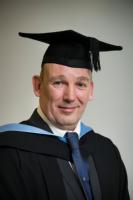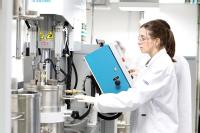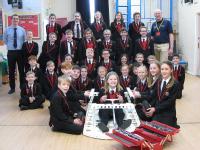WMG News
Professor Tony McNally announced as Editor-in-Chief of new Functional Composite Materials journal
 Professor Tony McNally, who heads up Nanocomposites research at WMG has been announced as the first Editor-in-Chief of the newly formed journal, Functional Composite Materials.
Professor Tony McNally, who heads up Nanocomposites research at WMG has been announced as the first Editor-in-Chief of the newly formed journal, Functional Composite Materials.
The Associate Editors and the Editorial Board, led by Professor McNally, include the leading academics in the field from around the world. The journal will consider contributions on all types of composite materials where composite functionality can be clearly demonstrated.
Functional Composite Materials is published by SpringerNature. The publisher producers a number of key research journals and books globally on science, technology, medicine, humanities and social sciences.
New battery testing laboratory unveiled at WMG
 Battery experts at WMG were pleased to welcome a special shipment from Austria in the shape of a new MW-scale battery research testing laboratory.
Battery experts at WMG were pleased to welcome a special shipment from Austria in the shape of a new MW-scale battery research testing laboratory.
The new high-tech laboratory, measuring 15m by 16m, was lowered into position by WMG’s Energy Innovation Centre (EIC) at the University of Warwick.
This new facility is funded through the Government’s Energy Research Accelerator (ERA) programme. There are three test modules. The first two provide battery pack testing up to a total power of 1MW, 1200V, 2400A. The third test module provides mechanical testing facilities to enable researchers to fully characterise a lithium-ion cell’s mechanical behaviour over its entire temperature and state-of-charge operating range.
Honorary degree for Lord Bhattacharyya
 Professor Lord Bhattacharyya was delighted to be awarded an honorary degree, for his contribution to business and engineering, by the University of York on Friday 19 January 2018.
Professor Lord Bhattacharyya was delighted to be awarded an honorary degree, for his contribution to business and engineering, by the University of York on Friday 19 January 2018.
Lord Bhattacharyya began his career as a graduate apprentice at Lucas Industries, subsequently gaining an MSc and PhD in Engineering Production at the University of Birmingham. In 1980, he became Britain’s first ever Professor of Manufacturing setting up WMG, at the University of Warwick.
Over the last 37 years he has built a world class research and education group working with industry to innovate and develop the leaders of tomorrow.
Today, WMG employs over 500 people across research, teaching, professional and administration. There are a total of 19 different research groups working across multiple sectors, and to date over 35,000 students from across 75 countries have studied here.
WMG graduates who worked while studying already promoted
 Gordon Harris from Solihull has worked in engineering for almost thirty years, and has just gained long-wished-for academic qualifications – boosting his career – after graduating with the first cohort from the Applied Engineering Programme (AEP) at WMG, University of Warwick.
Gordon Harris from Solihull has worked in engineering for almost thirty years, and has just gained long-wished-for academic qualifications – boosting his career – after graduating with the first cohort from the Applied Engineering Programme (AEP) at WMG, University of Warwick.
Harris has been an employee at Jaguar for twenty-eight years, most recently for the Advanced Manufacturing Engineering team at Jaguar Land Rover (JLR). Born and raised in Solihull, he always dreamed of getting a university education, but wasn’t able to fit in studying whilst working a full-time job.
JLR sponsored Gordon to enrol on the AEP, a four year part-time specialised WMG degree course, in 2013. Since beginning the course, he has been promoted to Lead Engineer for a JLR project.
“The learning gained during the last four years has helped me to achieve my promotion and additional responsibilities with my current role,” said Gordon. “The course has encouraged my development and has given me greater insight across more aspects of the business, which has helped me with my day to day role.”
The part-time AEP course enables people who already work in industry, of all ages and backgrounds, to gain a formal engineering qualification, offering a flexible and non-traditional path into university education.
Adding graphene girders to silicon electrodes could double the life of lithium batteries
New research led by WMG, at the University of Warwick has found an effective approach to replacing graphite in the anodes of lithium-ion batteries using silicon, by reinforcing the anode’s structure with graphene girders. This could more than double the life of rechargeable lithium-ion based batteries by greatly extending the operating lifetime of the electrode, and also increase the capacity delivered by those batteries.
WMG PhD student recognised by FORBES 30 Under 30 Europe 2018
 We are delighted to announce that one of our PhD students, Siddartha Khastgir, has been recognised as part of the prestigious FORBES 30 Under 30 Europe Industry list.
We are delighted to announce that one of our PhD students, Siddartha Khastgir, has been recognised as part of the prestigious FORBES 30 Under 30 Europe Industry list.
Siddartha joined other ‘young disruptors’ at an exclusive launch event in London last night (Monday 22 January 2018), to celebrate the brightest young entrepreneurs and breakout talent in Europe.
Siddartha sits within the Intelligent Vehicles team at WMG working under the supervision of Professor Paul Jennings on ‘Developing testing methodologies for ensuring safety of autonomous vehicles and his work is influencing international standards.’
In June 2017 he was elected to the respected IMechE Council of Members. He also holds a number of other key positions at IMechE too, as Chair of the IMechE International Young Member Committee, and as a member of the International Strategy Board of IMechE.
In April he also received the prestigious ITS UK national award for Young Professional of the Year in the field of Intelligent Transportation Systems (ITS), and more recently he was declared the UK’s leading engineer under 30 at the TechWorks Awards.
WMG joins two new Faraday battery research projects: part of a £42 million UK initiative
 Today, Tuesday January 23rd 2018, the Faraday Institution announced up to £42 million in new government funding to four UK consortia to conduct research aimed at overcoming battery challenges to accelerate the electric vehicle revolution, and WMG at the University of Warwick will be partners in two of those four new consortia.
Today, Tuesday January 23rd 2018, the Faraday Institution announced up to £42 million in new government funding to four UK consortia to conduct research aimed at overcoming battery challenges to accelerate the electric vehicle revolution, and WMG at the University of Warwick will be partners in two of those four new consortia.
The Faraday Institution, which WMG at the University of Warwick helped to form, is the UK’s independent national battery research institute, and it was established as part of the government’s £246 million investment in battery technology through the Government’s Industrial Strategy. Its formation was announced in October 2017 by the Business Secretary Greg Clark. The research it supports at organisations such as WMG at the University of Warwick aims to put the UK on the map as being at the forefront of battery technology worldwide and radically increase the speed with which we are able to make the move to electric vehicles.
Students wanted to help develop new Master’s module
 We’re on the lookout for three local students to help develop our new Play: Pedagogy Theory and Practice module, ready for launch in September 2018.
We’re on the lookout for three local students to help develop our new Play: Pedagogy Theory and Practice module, ready for launch in September 2018.
Mairi Macintyre, the Principal Teaching Fellow leading the programme explains: “With our colleagues at Warwick Business School and the Learning and Development Centre, we successfully applied for funding from the Institute for Advanced Teaching and Learning (IATL) at Warwick to develop the new module in a partnership with Design Museum London and Royal Holloway University of London plus international colleague at Leiden University in the Netherlands and Monash University in Melbourne, Australia.”
“We’ve now set up a special steering group with all the partners, and are looking to recruit three creative students to join us to help bring the module to life. Students will be paid for their time and will need to commit half a day a week for a 10 week period. Depending on our progress it may also lead to a summer internship.
“Play is, all too often, best viewed as ‘just for kids,’ but it has a big part to play in higher education too. Its theoretical home lies somewhere between philosophical and pedagogical and its application spans all disciplines. If we can successfully develop it for higher education it can be transferred into industry driving creativity and innovation.”
Young engineers build own electric kit car with WMG
 WMG at the University of Warwick will be lending a hand to budding young engineers from The Richard Crosse C of E Primary School in Kings Bromley, Staffordshire, in their quest to build and race their very own electric kit car.
WMG at the University of Warwick will be lending a hand to budding young engineers from The Richard Crosse C of E Primary School in Kings Bromley, Staffordshire, in their quest to build and race their very own electric kit car.
Class five at Richard Crosse won a competition run by the Advanced Propulsion Centre (APC) to become one of eight schools presented with a Greenpower Goblin kit car.
Each winning school is partnered with an APC Spoke - in this case WMG, who will offer guidance and support to the students.
The children, aged 9-11, have been given an electric kit car to design, build and race - guided by their teachers and WMG mentors. Once complete, the children will compete against each other in a regional Greenpower IET Formula Goblin race in summer 2018.
Formula Goblin has been set up with help from the Greenpower Education Trust to address the skills gap that is growing in the UK automotive industry by engaging students in engineering at a young age. It is designed to engage students with maths, science and design technology in a fun way, promoting equality regardless of economic background and gender.
3D printing helps carve out Christmas treat
 A Coventry firm has turned to 3D engineering experts from WMG to help create a new range of unique biscuit treats – Mug Huggers – that sit on the side of a mug.
A Coventry firm has turned to 3D engineering experts from WMG to help create a new range of unique biscuit treats – Mug Huggers – that sit on the side of a mug.
Arden Fine Foods, a Tile Hill-based firm specialising in sweet and savoury bakery products, were keen on producing the creatively shaped biscuit, but to achieve this vision they needed to engineer a unique shape to cut the biscuit dough.
The challenge required employing a flexible process that could easily be altered when minor shape changes were needed – allowing for design freedom and efficient tool manufacture.
WMG researchers used 3D printing, design and additive layer manufacturing capabilities, to help explore new designs and create dough cutters that were used to trial a number of different biscuit shapes, allowing the company to achieve the perfect shape before investing in a drum to fit onto the dough-depositing machine.
